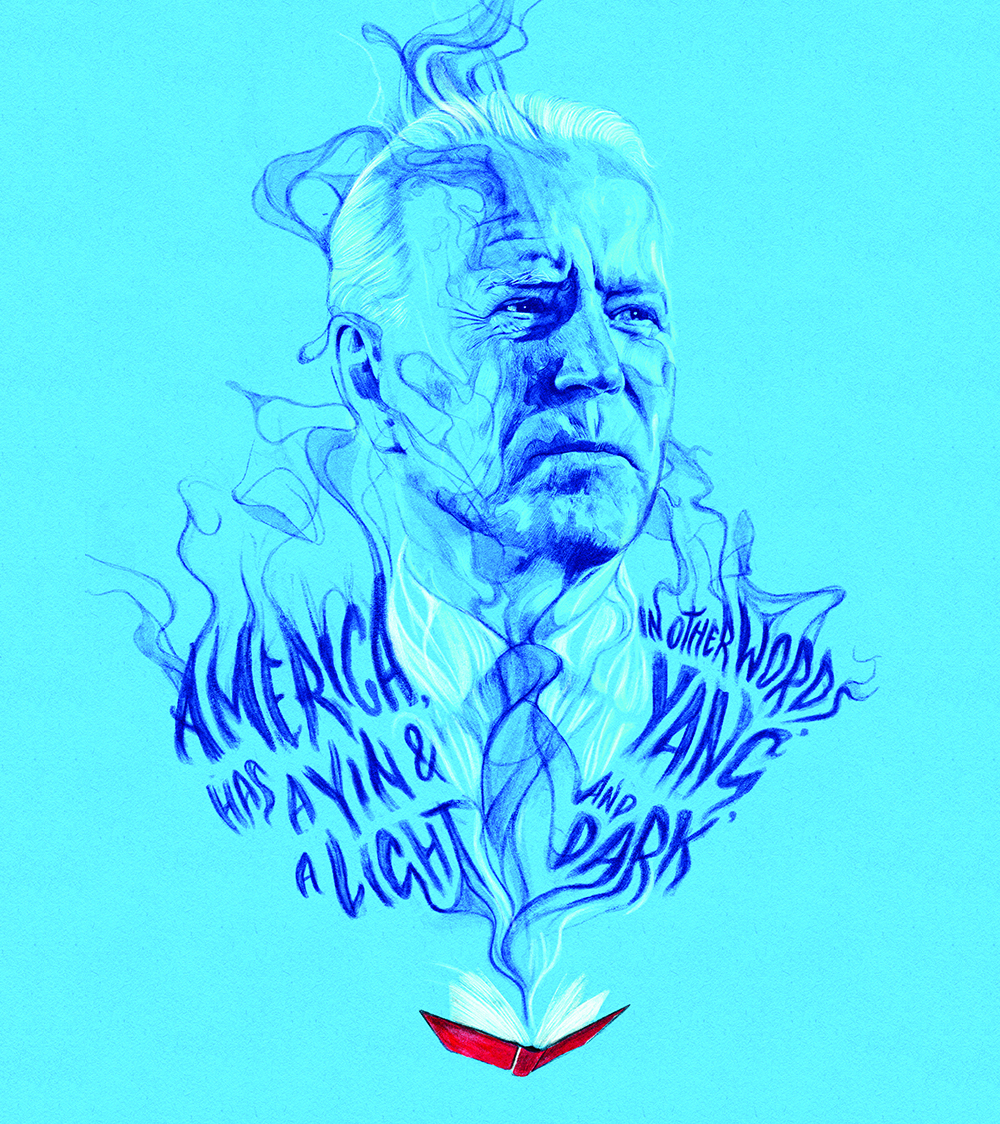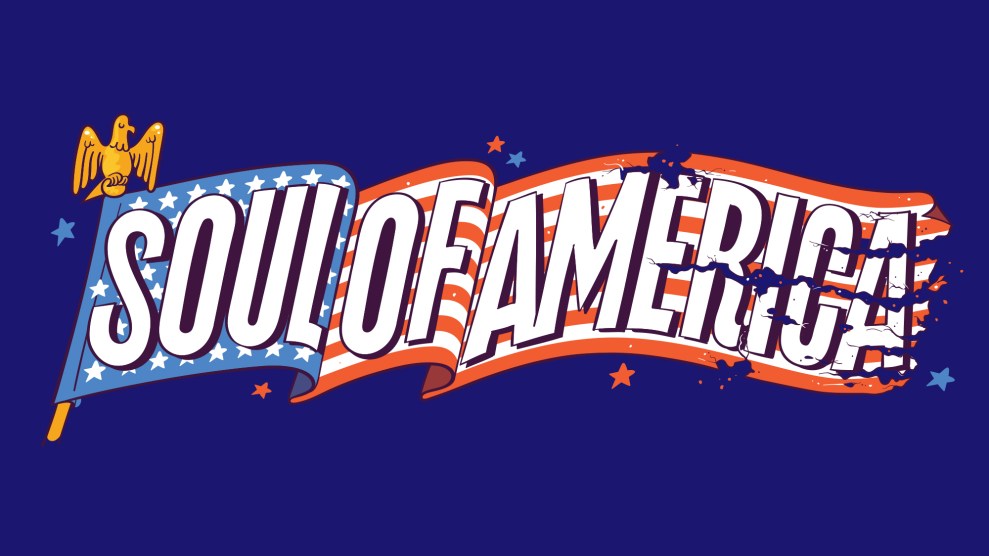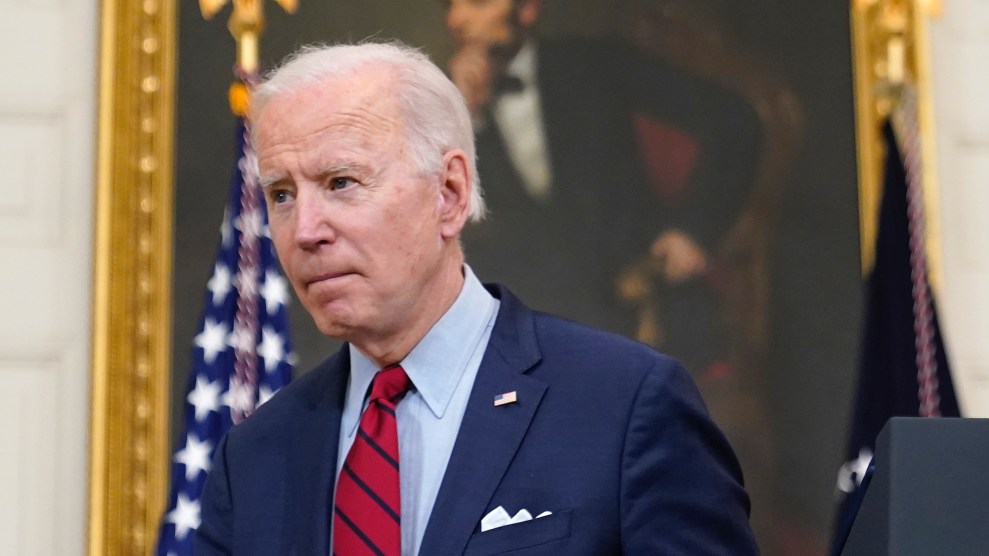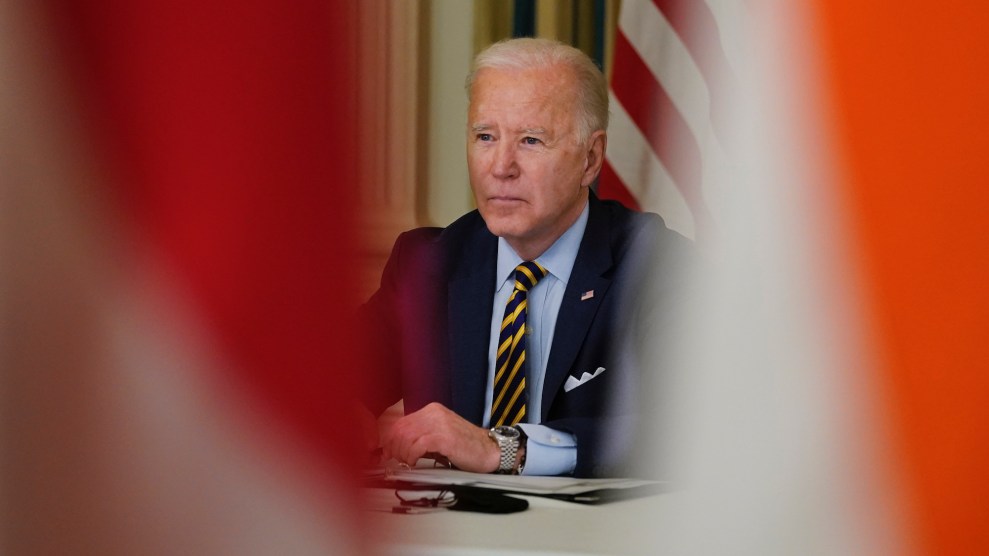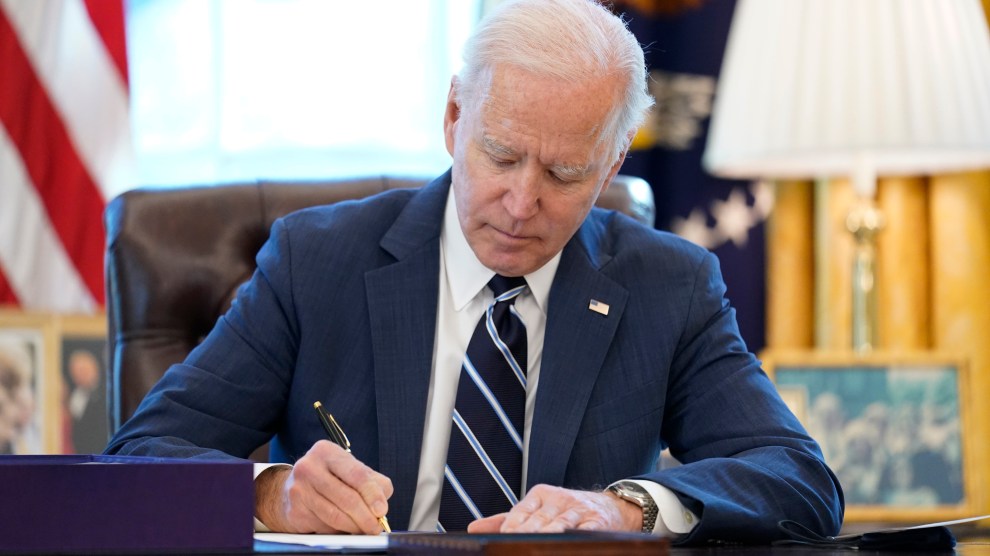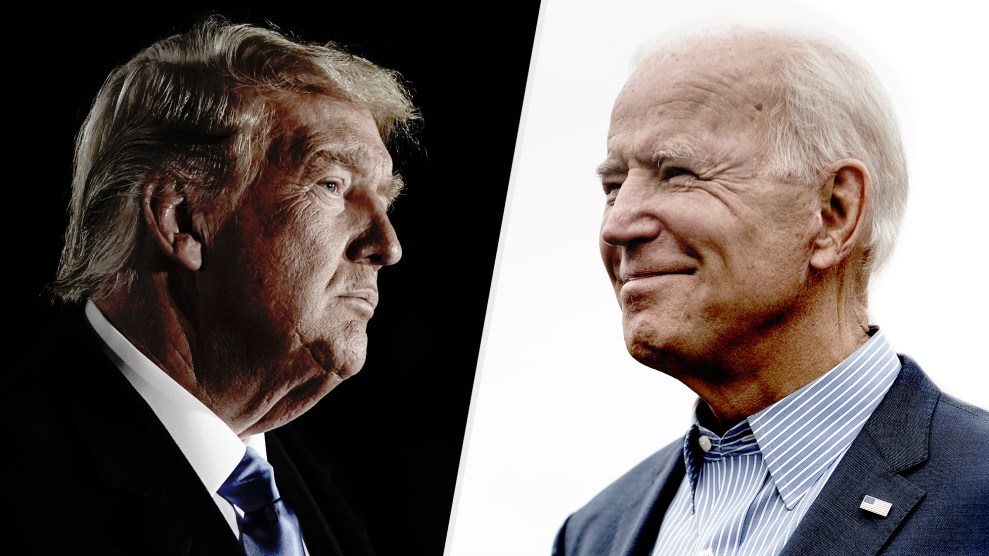In February 2019, Joe Biden paid the University of Delaware a visit to celebrate the renaming of its public policy school in his honor. Biden, a famously middling student, feigned sheepishness over his alma mater’s tribute and suggested the honor really belonged to his sister and perennial political adviser, Valerie. “She graduated with honors,” Biden explained. “I graduated.”
But Biden had no doubts about the brilliance of the man seated next to him on the stage: Jon Meacham, a Pulitzer Prize–winning biographer who has spent the last two decades pounding out bestselling accounts of American presidents such as Thomas Jefferson, Andrew Jackson, and George H.W. Bush. “You tend to find genius in those with whom you agree,” Biden said in a very loose paraphrase of Ralph Waldo Emerson. “I think he’s a genius.” Meacham, sporting a black suit and wide cornflower tie nearly identical to the vice president’s, gave a hearty laugh through his wide and toothy grin, the faintest of blushes spreading across his face.
To mark the occasion, Biden had invited Meacham to Newark, Delaware, for a conversation about the biographer’s recent volume, The Soul of America: The Battle for Our Better Angels, a 416-page meditation on how enlightened political leaders, propelled by a civic-minded citizenry, have rescued America at its darkest hours. Meacham had just finished explaining that the country’s soul “is not all good or all bad” but rather an abiding conflict between “our better angels” and “our worst instincts.” Biden’s praise came in response to Meacham’s assertion that politicians are far more often “mirrors of who we are,” rather than “molders” of it. “That’s an uncomfortable truth,” Meacham said, an oblique reference to the white supremacist who at the time was behind the Resolute Desk.
For more articles read aloud: download the Audm iPhone app.
But history proves not all is lost, Meacham explained. “If we realize that we’ve come through, in this journey to make a more perfect union, storm and strife, and that that’s far more the rule and not the exception,” he said, “that history gives us an orienting capacity.”
Two months before Biden announced his third run for the presidency, the intellectual underpinnings of the campaign were already in place. His ensuing candidacy was an exercise in moving Meacham’s thesis from the page to the stump. Biden cribbed Meacham’s book title for his campaign framing, a “battle for the soul of the nation.” Meacham occasionally weighed in on the narrative and thematic elements of Biden’s major speeches. He even made a five-minute appearance at the Democratic National Convention over the summer to endorse Biden and define the stakes of the election on the terms he presented in his book.
As the Biden candidacy gave way to the Biden presidency, Meacham lingered on as a sort of historical and spiritual adviser to a White House beset by crisis. Biden has an agenda that reflects the center of his party, not the center of the nation, but he remains a staunch institutionalist who insists on bringing the country together through leadership that, in Lincoln’s words and Meacham’s assessment, appeals to the “better angels of our nature.” The question now facing the Presidency According to Jon Meacham is what to do when all those better angels are crushed beneath America’s institutions.
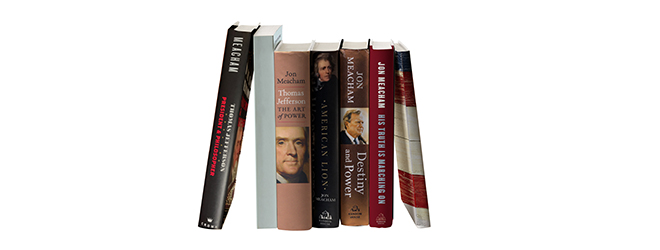
Meacham grew up on a Civil War battlefield in Chattanooga, an upbringing he credits with granting him both a “tactile” and Faulknerian sense of the past—which is to say it’s not even past. After graduating from Sewanee—salutatorian, besting both Joe and Valerie—he took a job at the Chattanooga Times before racing up the rungs of national political journalism at Washington Monthly and Newsweek, where he became managing editor at 29 and editor-in-chief at 37. Meacham began moonlighting as a biographer in the early 2000s, tackling the relationship between Franklin Delano Roosevelt and Winston Churchill as his first subject. In 2009, he won a Pulitzer for a biography of Andrew Jackson. The following year, when a then-hobbled Washington Post sold the wobbling Newsweek, Meacham departed journalism altogether.
In 2004, a media columnist called Meacham “the oldest 34-year-old journalist in the world,” a superlative intended to convey “stature, not advancing age.” But there is a decidedly old-timey vibe to Meacham, who describes himself as some combination of “white,” “Southern,” “Episcopalian,” and “boring.” He has voted for presidents of both parties and has suggested he will again. At 51, Meacham is closer in age to Alexandria Ocasio-Cortez than he is to the nearly octogenarian president, though if you’d been in the audience at that University of Delaware event two years ago, you’d have been hard-pressed to believe it. Maybe it was the matching outfits and Meacham’s prematurely white hair, neatly parted and swept to the side. Maybe it was the choice of subject: long-dead American presidents, a topic typically favored by the History Channel Dad set.
Meacham often calls himself a biographer, a subtle but meaningful styling that has the effect of distinguishing him from a historian, a trade that’s subject to rigorous peer review and an imperative to arrive at novel conclusions. Indeed, of the dozen or so prominent American historians I asked to speak with about Meacham’s work, most declined, professing a lack of familiarity with his output. (“Haven’t read The Soul of America,” one wrote me, “though someone gave it to me long ago and it sits on my shelf.”) His work is blurbed largely by fellow former journalists who have similarly crossed the threshold to history-writing, Pulitzer Prize–winning, airport-bookstore glory: Doris Kearns Goodwin, Walter Isaacson, and David McCullough. “These books sell like crazy—and they don’t have to be original,” David Waldstreicher, an American historian at the City University of New York, tells me. “If you have a narrative flair, this is an easy kind of history to write.”
“Founders chic”—that’s what Waldstreicher calls the genre. The dawn of the 21st century brought with it a vogue for doorstop biographies about the men who allegedly made America. McCullough on John Adams. Isaacson on Ben Franklin. Ron Chernow on Alexander Hamilton. The phenomenon was not new—the 1820s and 1880s saw a similar burst of founderphilia—but it was shaped by the political moment. A president disgraced by a sex scandal had been succeeded by another who owed the office to a politically brokered victory and had dragged the country into a terrible and misbegotten war.
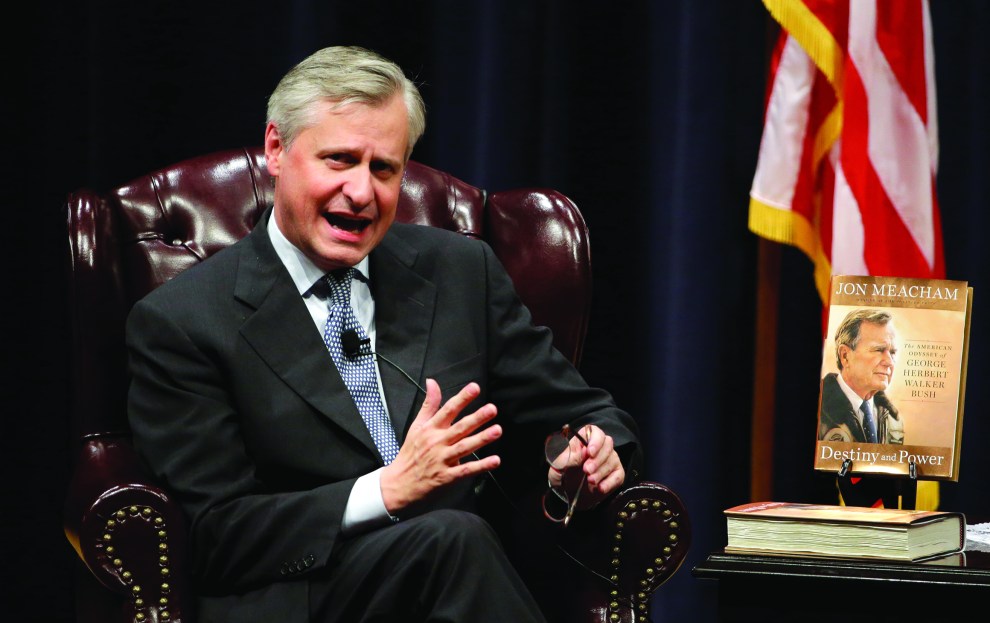
A thousand points of light reading: Jon Meacham speaks about his George H.W. Bush biography in 2015.
David J. Phillip/AP
The Flawed Giant School of history—the coinage is Jill Abramson’s, from her review of Meacham’s 2012 book about Jefferson—also mirrored an intellectual stirring in the academy. In 1993, political scientist Rogers Smith wrote of American political culture “as the often conflictual and contradictory product of multiple political traditions.” It was a response to the consensus history of the postwar midcentury, which downplayed social and class conflict in favor of a story of America defined by continuities in its liberal, democratic culture. A generation of Cold War–era historians, gazing out over the ruins of Europe, reimagined the nation’s founding as an undying oath sworn to grand principles of popular consent and equal rights for all. Smith and like-minded contemporaries maintained that that was only part of the story.
They sought to square the consensus paradigm with the more radical historiography that had grown out of it and ultimately challenged it in the 1960s. “American Revolutionary leaders embraced more radical ideas than they were actually willing to implement,” Smith explains. “They began talking about inalienable human rights and asserting all men, at least, are created equal. At the same time, they were practicing these systems of domination over people of color and women.” America, in other words, has a yin and yang, a light and dark, capable of enlightened egalitarianism alongside Native expropriation and slavery, all at the same time. The country itself was a flawed giant.
Here was a story Meacham could tell, full of almost religious ambivalences but with a certainty underlying them all that good would win out. He gravitated toward subjects that highlight America’s warring impulses, framing the country’s best traditions as its truest traditions. Thomas Jefferson owned slaves and “defined human rights for a new age.” Andrew Jackson’s presidency was “marked by both democratic triumphs and racist tragedies.” George H.W. Bush opposed the Civil Rights Act as a Senate candidate in 1964, “only to vote for open housing in Congress four years later.” Meacham thus renounces Great Men hagiography but supplants it with a hagiography of the country itself. If Meacham’s subjects are imperfect leaders, they are redeemed through their dedication to the more perfect union. It’s a secular hymn, sung in harmony with Cold War liberalism and written in the key of Arthur Schlesinger Jr.’s “vital center.”
At one point during their conversation at the University of Delaware, Biden asked Meacham, “What is the most important attribute for a president to have?” Meacham answered without hesitation: “It’s all about temperament and vision.” The presidents remembered most fondly, Meacham explained, are the ones who “reached beyond their base of support” and have done so in a way that has surprised us: Abraham Lincoln and the Emancipation Proclamation, Lyndon Johnson and the Civil Rights Act, Ronald Reagan playing with children alongside Gorbachev in Red Square. The biographies consistently praise those seeming apostasies, as well as the art of the compromise and the importance of a sound character.
The formula both flatters and flattens the American experience. Meacham is strict in his mission to evaluate his subjects only by the standards of their eras. “He is not a man of our time but of his own, formed by the historical realities of the eighteenth and nineteenth centuries. He must be seen in that context,” Meacham writes of Jefferson in the introduction to his 2012 volume, seemingly less an injunction to historicize than an attempt to narrow the terrain of judgment. “It is also true, however, that many of his concerns were universal. His was a particular life of perennial significance.”
In enjoining readers to grade on a moral curve, Meacham assumes we’ve advanced along its arc, as if the past four years weren’t a convincing argument otherwise. The result is a historical view that places Jefferson, an enabler of slavery, and Jackson, an adamant defender of it, on equal footing with another Meacham subject, John Lewis, who dedicated his life to fighting the institution’s legacy—all of them great patriots because they served with nothing but their country’s best interests at heart, particulars and outcomes be damned. Lost on Meacham is the possibility that those very interests might have been built on the subordination of certain classes of people. You won’t find a ton of structural explanations for the state of America in his writings—save, perhaps, for the fact that the American structure of government places a premium on compromise. Presidents may not be “molders,” but in Meacham’s work you’ll still find a country shaped by their rhetoric and ideals. By way of explaining historical and contemporary political developments, he’ll quote Heraclitus: “Character is destiny.”

It’s easy to see how a politician like Biden plugs into a Meachamian worldview. “Meacham can evoke that liberal era in which Biden came of age,” says Sean Wilentz, a historian at Princeton University. “It’s memory and politics and spirit.” The president also is a devout Roman Catholic who finds resonance in the Episcopalian Meacham’s homiletic histories.
Biden began routinely singing Meacham’s praises on the 2007 campaign trail during his second unsuccessful run for the presidency. Meacham’s second book, American Gospel, had debuted that year and told the story of America’s “public religion,” born of the founders’ Christianity and nurtured in the promise of individual liberty. Biden delighted in Meacham’s notion that religion “shapes the life of a nation without strangling it,” as the then-senator said at an event in San Francisco in 2007. “There is this notion that we are a spiritual nation—to pretend we’re not, I think, is to deny reality,” Biden explained. “I think they”—Americans—“want to look to their leaders and get the feeling that they think there’s something bigger than they are.”
Biden studied American Gospel like scripture, carrying around laminated sheets of his favorite passages as he campaigned with Barack Obama in 2008. His interest kicked off a friendship with Meacham, and the two would have “periodic, spirited conversations” on American history. When The Soul of America was published in 2018, Biden called up the biographer to read key passages aloud to him. “He’s very interested in, how does the country come out of a crisis stronger, not weaker?” Meacham told the New York Times last summer. “He wants to know, what does history tell us about American renewal?” (Meacham, who does not discuss his relationship with the president, declined an interview request for this story.)
Biden’s interest was unsurprising: Like American Gospel, the later book soars above partisan conflict, championing a civic Christianity and orienting American history around certain core national values. And if that other book had been an inspiration for Biden, The Soul of America was a blueprint. Just as Meacham framed Soul of America against Trump’s “very fine people on both sides,” so would Biden frame his campaign. He kicked off his 2020 campaign with a video invoking the memory of 2017’s far-right violence in Charlottesville, where Meacham’s prologue opens.
Meacham weighed in on Biden’s speech when he accepted the Democratic nomination, as well as his first remarks as president-elect, both of which underscored his mission to “restore the soul of America.” He also had a hand in the speech Biden delivered in Gettysburg last October, using the platform of a sacred Civil War battlefield to promise he would “be a president for all America.” The New York Times reported that Meacham would offer edits and at times write whole drafts. In a conversation with students at Vanderbilt University after the election, Meacham downgraded his influence. “I was part of conversations and contributed to the process that led to a couple big speeches,” he said, rejecting insinuations that he was “in any way the sole author.” Regardless, Meacham lost his MSNBC contributor contract for not disclosing his advisory role with the campaign.

Meacham’s thematic gestures and his pronouncements on the importance of leadership tap into a well of sentiment that, for all its banality, remains politically potent—Joe Biden’s successful candidacy is proof of that. Fluency in American sentimentalese seems at least outwardly preferable to the previous president’s surly ahistoricism, but both offer an impoverished vocabulary for clarifying a crisis.
What happened in the US Capitol on January 6, for example, wasn’t some failure of moral suasion. It was a violent attempt to overthrow a multiracial would-be democracy, enabled in many ways by that democracy’s own constituent parts. The attack suggested a different set of national continuities than the ones envisioned by Meacham. Racist sabotage, antidemocratic terror, whiteness fighting to retain its prerogatives—here was the soul of America, inscribed in the institutions to which Biden swears allegiance.
There are greater tests ahead for Biden, requiring a major course correction. In his review of Soul of America, Wilentz dings Meacham for ending the book with an uplifting account of the passage of the Civil Rights and Voting Rights Acts without any discussion of how the modern-day Republican Party came to be: White backlash, Nixon’s Southern Strategy, and Reagan’s racist dog whistles “received extremely short shrift” in his view. “Absent that central explanation,” Wilentz writes, “this book cannot adequately address and measure what’s gone so wrong with the American soul.” Meacham can’t see the crisis for what it is because he won’t see America for what it is—not a flawed giant of a country, shambling toward its appointment with greatness, so much as a country that became a giant because of its flaws.
There’s evidence already Biden is aware of the limitations of his campaign rhetoric. He pushed his $1.9 trillion COVID relief package through the simple-majority budget reconciliation process, not regular order as he’d hoped, and he has suggested he’ll do the same for his infrastructure and jobs proposal. His White House is defining bipartisanship by the popularity of the relief measures across voters of both parties, not by the stubbornness of the federal lawmakers who belong to them. “I haven’t been able to unite the Congress, but I’ve united the country,” Biden said during his first press conference last week. He’s shown an openness to restoring the talking filibuster—a gateway to diminishing its power without abolishing it altogether.
In early March, Meacham organized a meeting of historians in the White House’s East Room. The list of attendees included such Meacham blurbers as Doris Kearns Goodwin and Walter Isaacson, as well as a handful of scholars from Ivy League universities. The two-hour conversation dabbled in the Greats—Lincoln, FDR, LBJ—and spanned topics such as “the elasticity of presidential power” and “the limits of going bigger and faster than the public might anticipate or stomach,” according to Axios. “I’m no FDR, but…” Biden reportedly said to Goodwin at one point. The implication, at least to Axios, was that he’d really like to be. Initial reporting suggested that those present encouraged the president to ditch bipartisanship and the filibuster; a source familiar with the meeting rejects that characterization and insists the conversation was far more mundane.
Whatever the particulars, the meeting suggested a different sort of infrastructure in need of some repair: our mythmaking. In the room were some of the people who had shaped the story that Biden now desperately needed to escape—the one about compromise and character, about a country impelled toward its destiny by the working out of differences among competing factions. New stories were needed, visions of bigness, of care at a national scale and beyond, of a capacity to dismantle the institutions that legitimate harm and exploitation. These things are part of the country’s political tradition, too. Biden’s presidency will be measured by the extent to which he can supplant the lessons of his muse with a new old story about the soul of America.
Note: This piece has been updated to reflect historians’ findings on Thomas Jefferson’s complicated relationship to the institution of slavery. On the one hand, Jefferson never publicly defended slavery and wrote of it as an unjust inheritance from the British colonies. On the other, he did not dismantle the institution as president and once chided an acquaintance for not having “invested in negroes.”
